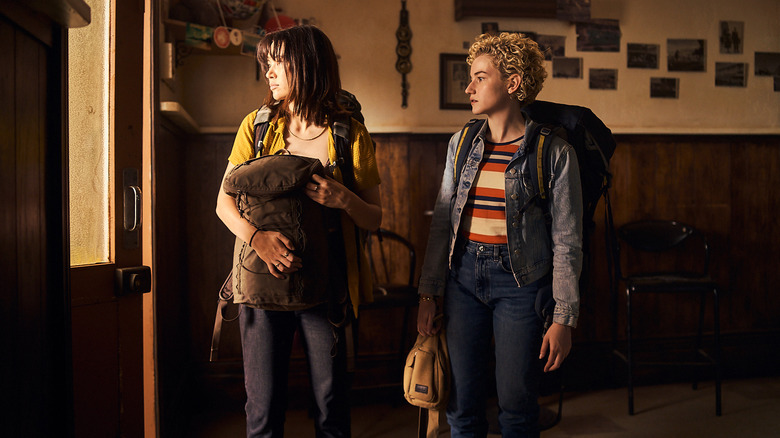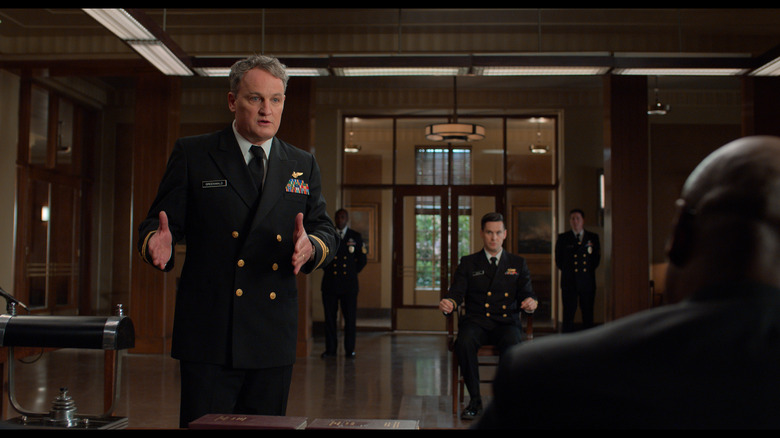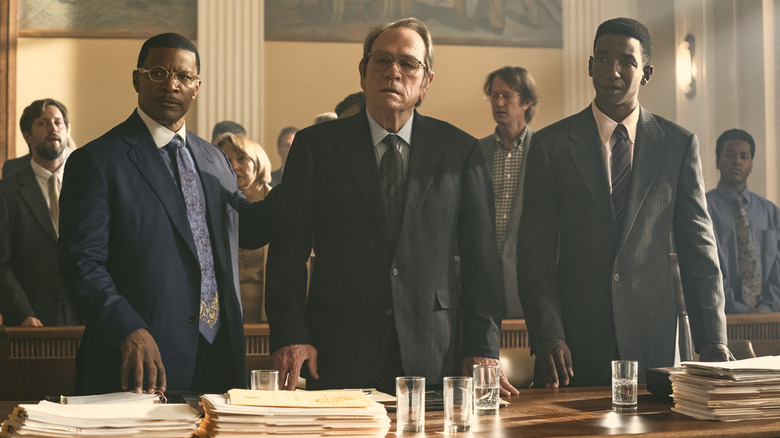The Royal Hotel Is The Best Movie You Didn't Get Around To Watching Last Month
(Welcome to Under the Radar, a column where we spotlight specific movies, shows, trends, performances, or scenes that caught our eye and deserved more attention ... but otherwise flew under the radar. In this edition: director Kitty Green and star Julia Garner keep the bad times rolling in "The Royal Hotel," the late, great William Friedkin says goodbye with one last banger in "The Caine Mutiny Court-Martial," and Maggie Betts' "The Burial" delivers a very different kind of courtroom drama.)
Oftentimes, there can be a certain kind of temptation with columns like these. In our enthusiasm to shine a light on the under-seen gems that not enough viewers may be aware of, writers like yours truly can go a little too far in singing the praises of movies that were never meant to be held up as "perfect" or "award-worthy" in the first place — whatever your definition of those highly subjective terms may be. Beyond the fact that evaluating art through such binaries is as harmful and reductive as it gets (movies are more than their Rotten Tomatoes scores or perceived prestige!), there's a whole world of cinema out there where the messiness in the margins hits harder than any slickly-made crowd-pleaser with no obvious flaws ever can. That's not a statement on quality, mind you, but an acknowledgement that storytelling is about the tension between where form and function meet. Life doesn't give us exactly what we want at all times, so why should our entertainment?
All this preamble is to say that, with October over, I found myself drawn to an even quieter, less flashy, and altogether more under-appreciated class of films than usual. These three movies represent the kind of solid, meat-and-potatoes filmmaking that's fallen by the wayside. That's what makes them all the more essential.
The Royal Hotel
Hell is real, and it's a dilapidated bar in a remote mining town filled with drunk, vaguely threatening Aussie men who can't (or won't) take no for an answer. Hanna (Julia Garner) and Liv (Jessica Henwick) are two young friends traveling the world, seeing the sights down under in an effort to stay as far away from home as possible. Although what exactly they're attempting to outrun is left as subtext, the rest of the film hits as hard as a blunt instrument to the face. When the pair's travel money finally runs dry, a last-minute job placement as bartenders far out in the boonies comes with the promise of quick cash ... provided they can deal with a little "male attention" from the gruff locals who, to put it mildly, don't get out very much.
Director Kitty Green, who most recently directed Garner in "The Assistant," revisits similar themes of entitlement and toxicity in environments dominated by men. In "The Royal Hotel," however, the inherent tension and horror of this dynamic takes on a much more literal tone, as what starts out as crude jokes, overt flirtations, and drunken harassment ultimately devolves into a waking nightmare. Bar owner Billy (Hugo Weaving) keeps their roughest and most unpleasant patrons in line, but even he comes saddled with his own demons. When easygoing Liv manages to adjust to their new surroundings much quicker than Hanna, their different personalities threaten to drive a wedge between the two friends — at a time when they need each other more than ever.
Harrowing, frequently unpleasant, but shot through with an acerbic sense of wit and dark humor, "The Royal Hotel" is more than worth a stay.
"The Royal Hotel" is currently playing in theaters and available to purchase or rent digitally.
The Caine Mutiny Court-Martial
Forget about being able to handle the truth, as Jack Nicholson so famously shouted at the peak of his "A Few Good Men" monologue. What if simply separating internal rationalizations from objective reality was impossible enough as it is? "The Caine Mutiny Court-Martial" is immediately distinguishable from most of its more well-known courtroom peers — not just because this latest adaptation marks the final work of director William Friedkin and one of actor Lance Reddick's last on-screen roles, but also as a result of its inherent staginess and one-location setting. Based on writer Herman Wouk's 1952 book that was eventually turned into a play, this film modernizes the story (last told in the 1954 film of the same name, starring Humphrey Bogart) of the Caine mutiny.
Although we never actually flash back to this event, we're told through a series of cross-examinations and legal explanations that a naval ship, the minesweeper USS Caine, became the subject of either a necessary transition of power from an incompetent and possibly mentally ill captain (Kiefer Sutherland's Phillip Queeg) during a genuine maritime emergency ... or a treasonous and unlawful mutiny, borne out of personal contempt. The defendant is Lieutenant Stephen Maryk (Jake Lacy) and his assigned lawyer is Lieutenant Barney Greenwald, with actor Jason Clarke taking a very similar role to his shrewd casting in "Oppenheimer." The comparisons end there, however, as the drama unfolds in a series of emotionally charged arguments and defenses that wisely leaves viewers to come to their own conclusions.
Playing out like a feature-length episode of "JAG" and consistently shot and edited with a rhythmic sense of pacing, Friedkin's final movie is Dad Cinema at its finest.
"The Caine Mutiny Court-Martial" is currently available to stream for subscribers to Paramount+ with Showtime.
The Burial
Part Saul Goodman-like showman and part Southern Baptist preacher, it's fitting that we meet Jamie Foxx's gregarious lawyer Willie Gary (who refers to himself in the third person almost constantly) as he delivers a guest sermon at a Black church in his very first scene. He then neatly translates all this over-the-top charisma to the comparatively more staid setting of a courtroom — but without ever losing an ounce of his charm. "The Burial" is ostensibly a two-hander between Foxx and Tommy Lee Jones' Jeremiah O'Keefe, a small business owner of a chain of funeral homes in 1990s Mississippi who takes a corporate magnate (an appropriately slimy Bill Camp) to court over an unjust contract dispute. But it's Foxx who walks away with the movie, providing a timely reminder of the movie star's irreplaceable screen presence following a recent medical emergency.
Directed by Maggie Betts from a script by Betts and Doug Wright, "The Burial" tells a typical underdog story of David vs Goliath heroics, racial prejudice in the American South, and the contempt of the 1% towards anyone who gets in the way of more profits. What it lacks in the sheer legal dramatics of "Better Call Saul," however, it more than makes up with its commitment to providing a family-friendly inroad towards some tough, but necessary conversations. Even my film-illiterate parents would gladly watch a Jamie Foxx movie where he plays a crusading attorney, but Betts stuffs in all sorts of blunt (but vital) commentary on microaggressions, unequal playing fields based on the color of one's skin (represented through opposing attorney Mame Downes, an excellent Jurnee Smollett), and what it really means to be an ally.
Although dumped straight to streaming, don't judge "The Burial" on looks alone.
"The Burial" is currently streaming on Prime Video.



